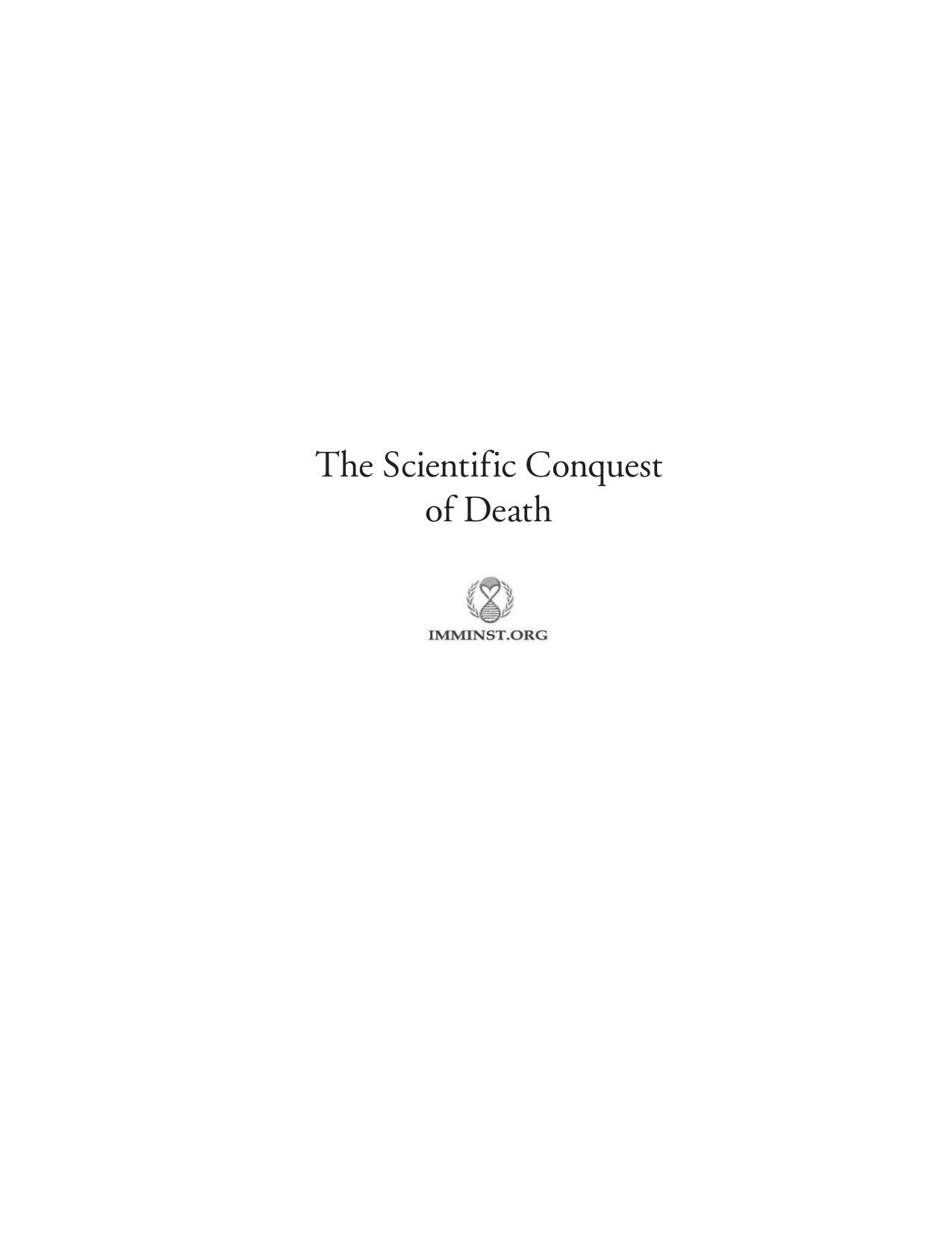The Scientific Conquest of Death by Immortality Institute

Author:Immortality Institute [Immortality Institute]
Language: eng
Format: epub, pdf
Tags: Science, Philosophy & Social Aspects
ISBN: 9789875611351
Google: EakLzDV-xJ0C
Amazon: 9875611352
Publisher: Bruce Klein
Published: 2004-01-15T03:23:24+00:00
23) Fahy GM & Wowk B & Wu J & Phan J & Rasch C
& Chang A & Zendejas E; “Cryopreservation of Organs by Vitrification: Perspectives and Recent Advances” in: Cryobiology (in press)
24) Ettinger RCW; The Prospect of Immortality (1964, 1st edition); Doubleday & Company
147
Medical Time Travel
25) Alcor Life Extension Foundation website: Alcor’s Pioneering Total Body Washout Experiments, http://www.
alcor.org/Library/html/tbw.html
26) Darwin M; “Cryopreservation of CryoCare Patient #C-2150” in: Biopreservation Technique Briefs (1996, Vol 18); http://www.cryocare.org/index.cgi?subdir=bpi&url=tech18b.
txt
27) Merkle RC; “The technical feasibility of cryonics” in: Medical Hypotheses (1992, Vol. 39); pg. 6–16
28) Drexler E; Engines of Creation (1986, 1st edition); Anchor Press/Doubleday
29) Darwin M; “The Anabolocyte: A Biological Approach to Repairing Cryoinjury” in: Life Extension Magazine (1977, July/August); pg. 80–63
30) Drexler KE; “Molecular engineering: An approach to the development of general capabilities for molecular manipulation” in: Proceedings of the National Academy of Sciences (1981, Vol. 78); pg. 5275–5278
31) Donaldson T; “24th Century Medicine” in: Analog ScienceFiction/Science-Fact (1988, Sept.); http://www.alcor.
org/Library/html/24thcenturymedicine.html
32) Freitas RA; Nanomedicine, Vol. I: Basic Capabilities (1999, 1st edition); Landes Bioscience
33) Freitas RA; Nanomedicine, Vol. IIA: Biocompatibility (2003, 1st edition), Landes Bioscience
148
Essays on Infinite Lifespans
Brian Wowk
34) Alcor staff; “Histological study of a temporarily cryopreserved human” in: Cryonics (1984, November); pg. 13–32
http://www.alcor.org/Library/html/HistologicalStudy.htm 35) Darwin M & Russell R & Wood L & Wood C; “Effect of Human Cryopreservation Protocol on the Ultrastructure of the Canine Brain” in: Biopreservation Tech Briefs (1995, Vol. 16) http://www.cryocare.org/index.cgi?subdir=bpi&url
=tech16.txt
36) Darwin M; “Cold War: The Conflict Between Cryonicists and Cryobiologists” http://www.alcor.org/
Library/html/coldwar.html
37) Darwin M; “The Myth of the Golden Scalpel” in: Cryonics (1986, January); pg. 15–18
149
CHAPTER II: PERSPECTIVES
Ethics, Sociology and Philosophy
We could end it here. The scientific story has been told, the experts have made their predictions, and the options have been presented. But the Institute’s mission has always been more encompassing. Many questions have been brought up: About what it means to be human, about what it means to be mortal; about the society of the future and the dreams that shape it today. In this section, we will encounter those who are enthusiastically supportive and those who are deeply skeptical of the quest for immortality.
But this section is not just about moral wrongs and (human) rights. We are also asked to consider deeper philosophical questions about time, identity, and our outlook on death and life.
We begin with “Some Ethical and Theological Considerations” by Brad F. Mellon. The editors must con-fess that in light of the recent statements made by the US
President’s Council on Bioethics, we were pleasantly surprised to encounter such a measured and thoughtful analysis of the relationship between Christianity and the scientific conquest of death. In concluding, Mellon leaves us with at least two questions: Why should we fear death and should we spend resources more wisely?
The latter question is often paraphrased as a Malthusian concern about limited resources. Surely there are too many people already? Yet, immortalist philosopher and founder of 153
Ethics, Sociology and Philosophy
the extropian transhumanist movement, Max More, argues that “Superlongevity without Overpopulation” is entirely feasible.
Another instinctive objection to the scientific conquest of death is to claim that dying is, after all, natural.
Download
The Scientific Conquest of Death by Immortality Institute.pdf
This site does not store any files on its server. We only index and link to content provided by other sites. Please contact the content providers to delete copyright contents if any and email us, we'll remove relevant links or contents immediately.
Enlightenment Now: The Case for Reason, Science, Humanism, and Progress by Steven Pinker(7303)
A Journey Through Charms and Defence Against the Dark Arts (Harry Potter: A Journey Through…) by Pottermore Publishing(4796)
The Immortal Life of Henrietta Lacks by Rebecca Skloot(4571)
A Journey Through Divination and Astronomy by Publishing Pottermore(4375)
Elon Musk by Ashlee Vance(4118)
Origin Story: A Big History of Everything by David Christian(3679)
COSMOS by Carl Sagan(3617)
Alchemy and Alchemists by C. J. S. Thompson(3508)
Bad Pharma by Ben Goldacre(3419)
Enlightenment Now by Steven Pinker(3363)
Shadow of Night by Deborah Harkness(3352)
Inferior by Angela Saini(3310)
A Mind For Numbers: How to Excel at Math and Science (Even If You Flunked Algebra) by Barbara Oakley(3293)
Origin Story by David Christian(3191)
The Code Book by Simon Singh(3172)
Signature in the Cell: DNA and the Evidence for Intelligent Design by Stephen C. Meyer(3123)
The Elements by Theodore Gray(3050)
A Brief History of Time by Stephen Hawking(3017)
A Journey Through Potions and Herbology (A Journey Through…) by Pottermore Publishing(2843)
